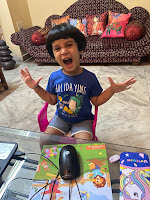Tips for Exclusive Pumping
Exclusive-pumping or as some people call it EP-ing is when due to some reason if the baby does not latch and the mother feeds the baby by expressing the breast-milk using a pump. This can be a phase for few but for lot of them the baby never latches and this journey continues throughout the entire period when the baby is on breast-milk.
I did not exclusively pump but there was a period when I was
continuously trying to pump to increase the supply and trust me, it is not as
easy as it looks. Direct breastfeeding is the safest option but if somebody
wants to pump to feed, special care needs to be taken to keep everything clean
and sterilized. You need to make sure milk is stored properly. When you are
pumping, that is the time away from your child and while doing that somebody
needs to or you somehow need to take care of the baby. Pumping requires discipline;
you need to plan and pump, to be ready whenever the baby demands milk. Unlike
direct feeding which you can do anywhere, anytime, things are not same with
pumping and feeding.
Tips for people who plan to exclusively pump or are already pumping-
1. Invest in a good pump. Nothing is more efficient than hand express but it is practically difficult to do regularly so buy a good electric pump. A good pump will help you extract the most. I have used Medela Mini electric (it is only useful for infrequent pumping) initially and also used Philips Avent. But I heard lot of good reviews about Spectra S2. In case you plan to exclusively pump try to buy an electric pump instead of manual so that you can keep your hands free.
2. Buy hands-free pumping bras. You can buy a pumping bra and
a double pump, it will help keep both your hands free when you are pumping and
you can do something else while on it or take care of the baby while pumping.
3. If you are doing it due to supply issue, continuously take
galactogogue containing food to help increase the supply. Take lots and lots of
fluid so that it helps extract the most milk during pumping.
4. As a religion, try to drink 1 litre of water
before and after every pumping session. It helps pump the milk easily, and
later on helps restore the fluid level in your body. If you feel, in any of the
pumping sessions that your supply has dipped instead of worrying (which works
against increasing the supply), take 1 litre of electrolyte solution and see a
bump in the supply in the next pumping session itself.
5. Maintain a routine. In order for you to be able to pump
especially if your supply is not too good, try to pump as regularly as
possible, I would suggest 1.5-2hours for 15-20mins. 15-20 mins is a good enough
time to extract the most from both the breasts. Pumping regularly helps keep up
the supply. Also try to maintain a routine and may be a time chart for pumping
so that you plan your entire routine accordingly and you would know when to
pump and how much to pump to meet baby's next meal demand.
6. It is very important to understand the storage aspect. If
not stored properly the milk will go bad, so all your effort will go waste and
if by any chance you feed it to the baby, the baby might get sick. There are
3 factors in storage- the container in which you need to store and the
temperature at which and for how long it can be stored.
I am sharing a table (provided by a lactation consultant to me), you can refer that for the time and temperature.
I am sharing a table (provided by a lactation consultant to me), you can refer that for the time and temperature.
For the storage make sure the storage containers are
sterilized before storing the milk. You can even buy specifically designed
storage bags in case you have oversupply and you maintain a stock.
7. Another tip as given to me by a lactation consultant was
that after every pumping session you do not need to wash the pump and the
bottles. Just put it in a zip lock pouch and keep it in refrigerator or even
without zip lock pouch. The idea is since breast milk remains good in the
refrigerator, any residue of that will also be good. Call me risk averse, I did
wash it and sterilize it after every pumping session. You can even invest in a
sterilizer to keep your life little easy.
8. Know the baby’s requirements. It is easy to over-feed the baby using the bottle as the baby does not know how to control the milk flow from the bottle. So know the baby’s requirement at each stage and buy a slow flow nipple bottles. Remember baby requirement for formula feeding and breast milk feeding will vary a little.
9. Lastly direct breastfeeding is also a way for the child
and mother to bond, it stimulates hormones that help your body to produce more
milk. When exclusive pumping, it is very important that you practice skin to
skin daily for atleast an hour.
PS- I am not a medical practitioner; these tips are based on
my first hand or second hand experiences.







Comments
Post a Comment